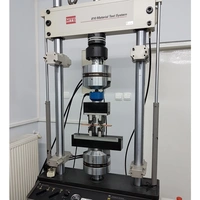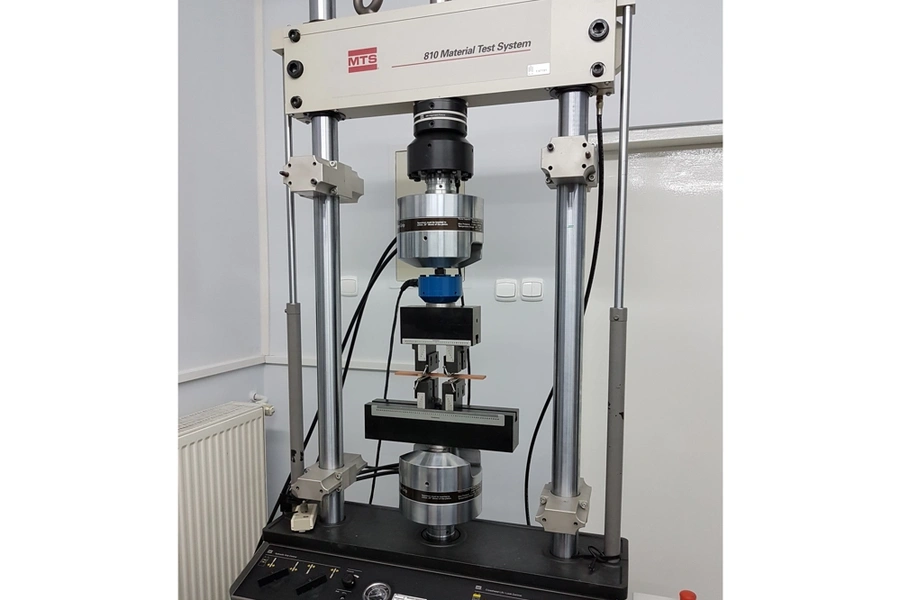Uniwersalna maszyna wytrzymałościowa MTS 810
Nazwa handlowa
Uniwersalna maszyna wytrzymałościowa MTS 810
Opis techniczny
Dwukolumnowa, uniwersalna serwohydrauliczna maszyna wytrzymałościowa umożliwiająca prowadzenia jednoosiowych badań statycznych i zmęczeniowych pod kontrolą siły, przemieszczenia lub dowolnego czujnika analogowego używanego w trakcie badań (np. tensometru, ekstensometru, itp.).
Przykładowe zastosowanie:
- wyznaczanie inżynierskich i rzeczywistych krzywych rozciągania,
- wyznaczanie monotonicznych właściwości wytrzymałościowych materiałów,
- statyczne badania w warunkach trójpunktowego lub czteropunktowego zginania,
- badania zmęczeniowe materiałów prowadzone (krzywa Wöhlera, krzywa Coffina – Mansona)
- wyznaczanie cyklicznej krzywej odkształcenia,
- wyznaczanie trwałości zmęczeniowej elementów konstrukcji oraz węzłów konstrukcyjnych przy dowolnych sekwencjach osiowych obciążeń,
- badania rozwoju pęknięć zmęczeniowych w metalach inżynierskich oraz elementach konstrukcji,
- wyznaczanie statycznych i dynamicznych charakterystyk elementów maszyn (w zakresie prędkości przemieszczenia do 150 mm/sek.)
Warunki udostępniania infrastruktury
Do ustalenia z osobą kontaktową
Rodzaj akredytacji / certyfikatu:
Nie dotyczy
Rodzaj dostępu
Zewnętrzna
Możliwości badawcze
- Badania statyczne: póby rozciągania, ściskania, zginania;
- Badania dynamiczne:
- badania zmęczeniowe nisko- i wysokocyklowe,
- badania propagacji pęknięć,
- badania rozwoju pęknięć zmęczeniowych,
- badania odporności na pękanie,
- badania charakterystyk dynamicznych materiałów i konstrukcji.
Data ostatniej aktualizacji
27 listopada 2024 18:22
Rok wprowadzenia do użytkowania
2007
Możliwości pomiarowe
- zakres obciążeń: +/- 100 kN;
- zakres przemieszczeń siłownika: +/- 75 mm;
- maksymalna prędkość testu: 150 mm/sek.;
- prześwit pomiędzy szczękami mocującymi: 0 - 1000 mm,
- średnica części chwytowej (próbki walcowe): 5.8-22.9 mm,
- grubość części chwytowej (póbki płaskie): 0-19 mm,
Zdjęcia

Maszyna wytrzymałościowa MTS 810

Jednostka odpowiedzialna
Grupa / laboratorium / zespół
Zespół Wytrzymałość Materiałów i Konstrukcji
Osoba kontaktowa
Obszary badawcze IDUB
(POB 4) Rozwiązania techniczne: od badań podstawowych, przez modelowanie i projektowanie, aż do prototypów. Zastosowania narzędzi matematyki, informatyki i elektroniki w problemach skali makro, mikro i nano
(POB 5) Materiały, technologie i procesy inspirowane naturą: biotechnologia, bioinspiracje w inżynierii i nauce o materiałach, biosensory, bioenergetyka, biokataliza, biokomputery i bioobliczenia
(POB 7) Projektowanie, produkcja, badanie nowoczesnych materiałów i przyszłościowych technologii w oparciu o multidyscyplinarne podejście łączące inżynierię materiałową z chemią, fizyką, matematyką i medycyną